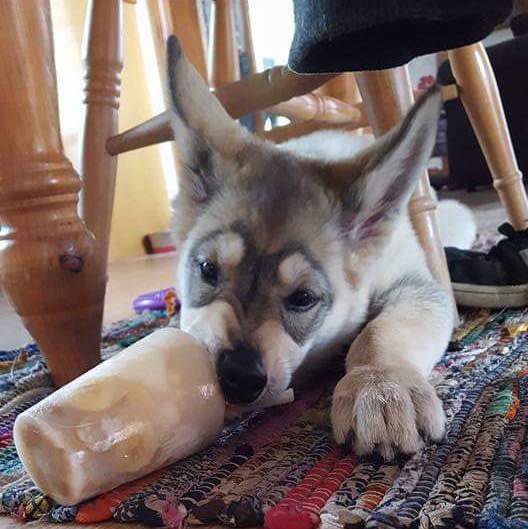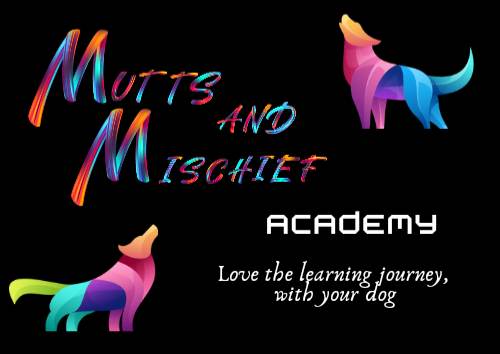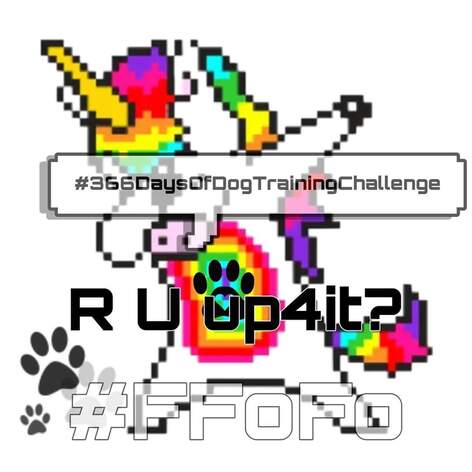 Audio - text to speech - 10 minutes 3 seconds duration - https://youtu.be/CVGtybWUv5c?si=t8Vb82o6hkw8o_1Z Many people who are autistic/ anxious or have developmental, neurological or mental health conditions (Neurodivergent) don't feel that they are the right type of person to have a dog. I was one of these people for many years, I worried I would make my dog anxious or stressed if I was to get a dog. Working in kennels I wanted to take them all home and couldn't see just how much I was doing for them and how much they enjoyed my company. Being referred to as quirky, highly strung, odd, sensitive, where my heart on my sleeve, weird etc or overlooked for my skills and talent because I am different. These are all extremely harmful and hurtful terms, especially when you are also overlooked because of someone's mindset about you. People would be quick to commend me and tell me what a wonderful way I had about myself with dogs to put the most anxious dogs at ease. But when it comes to the crunch, it is always a case of being overlooked. Which is not ideal for anyone's confidence or harmful self beliefs because of others and their opinions and lack of empathy, tolerance and understanding. I want to remind those like myself who are also neurodivergent or disabled that there is absolutely nothing wrong with us having dogs. Some studies have found long term stress for humans can affect dogs also (but what they mostly found was this was actually with guardians who took their dogs to agility). (1) Studies are extremely limited and work with a controlled section of breeds, sex, humans and environmental factors. For example in the study conducted by Sundman et al (2019). Their study was limited to 58 humans and their dog which was either a Border Collie or Shetland Sheepdogs. If we look at another journal we find that there has been a study focused on Border collie behaviour. “Individual and group level trajectories of behavioural development in Border Collies.” This study focused on 69 Border Collies which placed an emphasis on the individual traits of each dog. (2) So it is very easy for a journal to say that science has found evidence that stressed owners stress their dogs. However this is a very small study and not one to a scale where this could be said definitively or one that could be applied to real relationships as the individual guardian and their family would have to be evaluated by a psychiatrist, an independent observer such as a behaviourist would have to fill in the questionnaires about the dogs perceived behaviour in the home etc and then the researchers would have to interpret this data. Which will never happen as this would just be too costly and many guardians would not want a live in behaviourist observing them nor would many people be open to a psychiatrist test to explore the five factor model and be assessed on their OCEAN traits of personality. (3) OCEAN stands for openness, conscientiousness, extraversion, agreeableness and neuroticism. For my Level 4 years ago I had to conduct this study on a cross section of willing friends who were also dog guardians. Some of them are neurodivergent and some not yet all scored very high for neuroticism. Which according to data doesn't make for a great guardian, except they were great guardians. We can absolutely not base a person's ability to be a good guardian based on their developmental, neurological conditions or mental health. All of my dogs support me and my mental health, they know when I am struggling and they offer comfort during these times. I am stressed most of the time and my dogs are not. If I have a particularly bad day this does not reflect in their behaviours, they aren't highly strung on walks, their fur patterns haven't changed, their diets and appetites haven't ever changed, playfulness or any other behaviour trait. Zombie, my youngest is a special needs dog and his behaviour is the opposite of what a dog should express, for example when he's enjoying cuddles that he instigates, he doesn't look soft and relaxed like a normal dog. He looks the complete opposite and if you stop because you're worried about his body language he communicates to you that you fuss him and he isn't finished. Many people said that I should euthanize him when he was younger and showed how different he was, but I persevered and made sure he was happy and comfortable just like my other dogs with different needs and arrangements made for him. Now I am commended for all I have done for him and how he is excelling and enjoying life. The relationship with your dog isn't about training and how your dog feels emotionally. It's about the connection you both have. Again if we look at the first study the dogs and humans both showed heightened stress partaking in dog sports. The pet dogs did not show this level of stress and nor did their humans. The researchers themselves admitted this needs to be studied further for a complete understanding. The most important thing is the connection you have with your dog. It doesn't matter if you're stressed, depressed, autistic or have another development or neurological condition or if you have a mental health condition. The connection you have with your dog and how you live with them, bond with them, play with them, communicate with them and love them is what matters. A dog and guardian relationship where the dog and the guardian share a secure connection is what matters. What many of us need to focus on whether you already have a dog or are considering adding to your family is self love which you can read about here and access self help tools. https://www.facebook.com/share/Aup95JhKk7BT4zCT/?mibextid=WC7FNe Dogs also do help people with mental health problems, developmental and neurological conditions. Studies that have found that guardians struggle with mental health are actually based on the reactivity of the human. Researchers found guardians of dogs may experience a form of caregiver burden as found in humans and families due to dogs being seen as a part of the family unit. (4) This reference is cited from a journal which was exploring how mental health is impacted by dogs. This particular reference was in reference to guardians with reactive dogs. These guardians displayed negative mental health due to their dogs behaviour and reactions to triggers but upon further analysis it was actually found to be due to society and not their dogs. Through the data that the researchers collected they found that there were four major areas which could be analysed as to understanding the breakdown in relationships and the struggles of behavioural challenges in dogs. Caretaking - expense of the vets, training, behaviour modification, breakdown in relationships, lack of understanding and support from friends and families. Emotions - both negative and positive emotions were reported. Negative included emotions such as anger, fear, frustration, sadness and resentment. Whereas some reported feeling that they had a stronger bond. Coping strategies - seeking help and getting support from trainers and behaviourists as well as some vets and therapists for themselves. Lack of understanding and support - from the general public on walks, friends and family and social media. (4) So when we look at these four categories, the dog isn't actually to be blamed. The frustrations all come down to money and having to spend more money than anticipated originally. Lack of support from friends, family and even some professionals as well as unsolicited opinions from the general public and social media. So here we aren't looking at dogs with behavioural problems as being the problem. We are looking at humans who are unable to deal with negativity from other humans and feeling that this all stems from their dogs behaviour. Guardians are negatively impacted due to other' s opinions. So coming back to where I discussed how dogs improve and aid our mental health and or developmental or neurological disorders this is true. It is society and people which cause harm to guardians with dogs with big emotions. People don't like to feel inadequate and some more than others, some guardians like myself can focus on their dogs strengths and support their dog through their anxiety and emotions and focus on a secure and healthy connection with the dog over training, trying to change an emotion quickly to “nip it in the bud” rather than heal the emotion or dog sports. So to conclude you are good enough to have a dog. I wish someone had said this to me over a decade ago. People are so quick to criticise and be unkind and people aren't so quick to lend support, love and strength. So if this has resonated with you, you are good enough for your dog and if you don't yet have a dog but want one. Welcome a dog into your family because you are good enough! References Sundman, AS., Van Poucke, E., Svensson Holm, AC. et al. Long-term stress levels are synchronized in dogs and their owners. Sci Rep 9, 7391 (2019). https://doi.org/10.1038/s41598-019-43851-x Riemer, S., Müller, C., Virányi, Z., Huber, L., & Range, F. (2016, July). Individual and group level trajectories of Behavioural Development in border collies. Applied animal behaviour science. https://www.ncbi.nlm.nih.gov/pmc/articles/PMC5295634/ McCrae RR, John OP. An introduction to the five-factor model and its applications. J Pers. 1992 Jun;60(2):175-215. doi: 10.1111/j.1467-6494.1992.tb00970.x. PMID: 1635039. V. Braun, V. Clarke.Using thematic analysis in psychology. Qual.Res. Psychol., 3 (2006), pp. 77-101 Image description: A baby Wolfdog under the table and chairs chewing on a frozen cup enrichment item
0 Comments
Leave a Reply. |
BlogFor Mutts & Mischief If you enjoy my blogs and
would like to support my work, you can support me by buying me a Coffee! Archives
July 2024
|
Or are you looking for support and would like to get to know us better?
If the answer is yes then click the image below to join my free facebook group. What is Mutts & Mischief Community?
So it is what it says on the tin! Its a community that is international of Clients and Colleagues with the most supportive and friendly people on the planet. Dog Trainers and Behaviourists from all over the world!
Why did I set up such a mammoth group?
I wanted to have a group exclusively for Clients. For support and to meet uo and build on friendships from Classes or One to Ones. I want Clients to see you are not alone with your Dog and the problem you maybe having that you are not the first and won't be the last! I wanted a safe place where Clients could trade stories good and bad in one place for free!
I also wanted a safe place for the Trainers and Behaviourists I mentor within Social Media Platforms.
Why do this for free?
Because when I say I offer an holistic service I really do. It isn't about the money it is about you and your dogs. You and your dogs are all that matter.
So I wanted to encourage people to do homework and build better quality relationships with their dogs. So 3 years ago I had a mad idea and set up the 100 days of dog training challenge. Once a day people would spend 5 minutes plus training their dog. Recording it and uploading their video onto the Community. Every participant recieved a Certificate.
What I didn't count on was how many Professionals wanted to join and how fast word would spread. So this year 2020 I set up a 366 days of dog training challenge.
We have Clients in America, Greece, Norway, Denmark and Spain. We have Trainers from Greece, Norway, Isle of Wight, America and many more Countries. As well as dog trainers and trainee behaviourists: I mentor all over the world.
So again yes this group is free. It is still primarily for clients and for people to get to know me but we also have the challenge running. Again for free. So if you want to join click the image below to be taken to the group directly. See you there!
So it is what it says on the tin! Its a community that is international of Clients and Colleagues with the most supportive and friendly people on the planet. Dog Trainers and Behaviourists from all over the world!
Why did I set up such a mammoth group?
I wanted to have a group exclusively for Clients. For support and to meet uo and build on friendships from Classes or One to Ones. I want Clients to see you are not alone with your Dog and the problem you maybe having that you are not the first and won't be the last! I wanted a safe place where Clients could trade stories good and bad in one place for free!
I also wanted a safe place for the Trainers and Behaviourists I mentor within Social Media Platforms.
Why do this for free?
Because when I say I offer an holistic service I really do. It isn't about the money it is about you and your dogs. You and your dogs are all that matter.
So I wanted to encourage people to do homework and build better quality relationships with their dogs. So 3 years ago I had a mad idea and set up the 100 days of dog training challenge. Once a day people would spend 5 minutes plus training their dog. Recording it and uploading their video onto the Community. Every participant recieved a Certificate.
What I didn't count on was how many Professionals wanted to join and how fast word would spread. So this year 2020 I set up a 366 days of dog training challenge.
We have Clients in America, Greece, Norway, Denmark and Spain. We have Trainers from Greece, Norway, Isle of Wight, America and many more Countries. As well as dog trainers and trainee behaviourists: I mentor all over the world.
So again yes this group is free. It is still primarily for clients and for people to get to know me but we also have the challenge running. Again for free. So if you want to join click the image below to be taken to the group directly. See you there!
Proudly powered by Weebly


